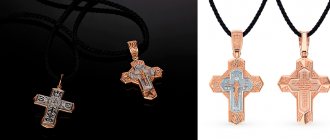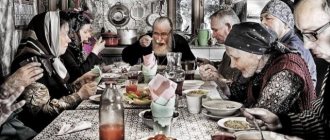Add to favorites
After the death of a person, his loved ones grieve, many of them are burdened by the things of the deceased. Often good things are left behind by the deceased - shoes, clothes and other wardrobe items.
The question arises: What to do with a person’s belongings after his death? Is it possible to wear things after a deceased person?
Death and the energy of death, is it possible to carry things after a deceased person? As for the energy of death, bioenergy throughout the world indicates that the energy of a living person is different from the energy of a dead person.
Many psychics, looking at the things of the dead, touching them, can say with certainty that the former owner of the thing is dead. The energy of death is addictive, it is cold and more viscous than the energy of life - this is what psychics indicate.
It is quite difficult to get rid of it. By washing an item, it is impossible to erase information about the life and death of its owner. Therefore, bioenergetics specialists and psychics do not advise buying used clothes. It can carry information about its deceased owner.
The Christian Church considers all of the above to be superstition. Superstition among Christians is a sin. The church does not give a clear answer to the question posed. Very often you can see how relatives bring things of the deceased to the Temple so that those parishioners who need them can use them. The Holy Father definitely sanctifies these things. But...whether he will finally remove all ties from this clothing or thing is a question.
When asked about the clothes of a deceased person, psychologists answer unanimously: you shouldn’t wear them. These things, especially if you saw them on the deceased, will always be associated with death and negative emotions. This is not the way to honor the memory of a person who has passed on to another world. His clothes, reminiscent of death, will sow anxiety, sadness and panic in you.
There is another side to the coin. For example, the deceased left behind expensive, high-quality clothes: a fur coat or a leather jacket. It’s a pity to throw away such things; it’s also unwise to give them as gifts, since they cost a lot of money.
Psychics' opinion
People with extraordinary abilities do not recommend wearing the clothes of a deceased person. The fact is that in every thing there remains a piece of the energy of the person to whom it belonged. If a person has passed into another world, then this energy is “dead”, negative. And when wearing clothes, it passes to a living person. A person who puts on the clothes of a deceased person unconsciously makes a necro-binding to himself, which is not so easy to cleanse himself from. Then the person begins to notice that he is often sick, feels weak, has no vital energy, wakes up in the morning broken, and feels unwell.
If you still want to use these things and try on the wardrobe of a deceased relative for yourself, then do this after forty days from the moment of his death. It is best to conduct an energy cleansing ritual before this to remove negative energy from the deceased’s belongings.
It goes without saying that underwear cannot be reused. You should definitely get rid of it. Also, do not wear clothes that the person died in. It is better to burn it or dispose of it in another way so that negative energy does not manifest itself. If you were on bad terms with a relative or he didn’t like you, don’t even think about appropriating his clothes. Such a step will definitely not bring you good luck.
Why you shouldn't save the things of the deceased
Now let’s clarify whether it is possible to distribute the things of the deceased. As we have already said, storing them is not recommended. The fact is that the death of a loved one, naturally, is associated with pain and suffering both for him and his relatives who are left alone with themselves. These experiences mix and create powerful negative energy around the deceased’s belongings, which accumulates more and more over time in the room where they are stored. This is especially true for everything that was in direct contact with the body, such as jewelry or costume jewelry, clothing, and especially bed linen. However, you can always take the jewelry to church and check with the priest whether you can wear them. It is likely that he will advise you to consecrate them, and after this the jewelry can be calmly put on, while remembering the deceased and praying for his soul.
By the way, priests say that you can wear a cross that belonged to a previously deceased person, despite the fact that there are completely opposite opinions on this matter. There is a superstition that by putting on the cross of a deceased person, a person thereby takes upon himself his lifetime sins, but this is really just a superstition.
Things of deceased people store energy
It is believed that things that the deceased often used during his lifetime store his energy. There are known cases when wristwatches stop at the moment of a person’s death, after a funeral, household appliances break down, and personal items acquire a specific smell that is simply impossible to get rid of. This is due to the fact that necropolis, i.e., the energy of death, which reflects his current state - the death of the physical body, begins to accumulate in the objects of the deceased.
All the things of the deceased, endowed with deadly energy, cannot cause much harm to people who begin to use them, but they also do not have a positive effect. Simply put, the belongings of a deceased relative do not bring good luck.
You should be especially careful with things made from natural materials - they are best able to absorb the energy of a deceased person.
There is a way that will help neutralize the negative energy of a deceased person remaining on his clothes. Psychics advise soaking the deceased’s clothes in salt water for several hours, and then rinsing them well, drying them and, of course, ironing them thoroughly.
However, this method is not effective in all cases. Sometimes the energy of a deceased relative is so strong that no rituals can remove it.
It is especially terrible to carry the things of a deceased person. And sometimes such things cannot even be cleared of negative energy by any rituals. Especially if the deceased person was attached to things and loved them.
I warn you: it is impossible to clean such things, no matter how hard you try. This is especially true for things that the deceased was in direct contact with at the time of death, that is, a bed, blanket, pillows, bedding, etc.
Information about death is very difficult, and it eats into things very deeply. A thing that has witnessed the death of its owner literally absorbs the very spirit of death, a kind of deadly program. And passes it on to the one who inherits this thing. So this program begins to work in relation to its new owner... Therefore, under no circumstances should you sleep on a bed or sofa on which a person died. And in general, keeping such a thing in an apartment is simply dangerous...
FAQ
People's rumors sometimes create their own rules and require everyone to strictly adhere to them. This also applies to the distribution of the deceased’s belongings and other handling of them. Relatives of a deceased person often have many questions regarding this topic that they have to deal with after the death of their loved ones. Many people ask Orthodox priests for advice, especially if the deceased was a believer.
Take or give things away
Is it possible to take the deceased's belongings or give them away after death? The Church does not put forward strict requirements for such actions, indicating that only close relatives of the deceased person can resolve such issues.
Nothing prohibits taking something in memory of a deceased loved one. The same applies to the desire to receive something for oneself that relatives want to give away after his death.
It is also not prohibited to distribute things to strangers or transfer them to various funds and organizations that help the poor. Moreover, such actions are considered a godly deed and are welcomed by Orthodox priests.
Throwing away
There are no prohibitions on throwing away the belongings of the dead. The Church in no way condemns heirs if they do not want to preserve anything after the death of their loved ones. But it is recommended to throw away only old, worn-out items that are not suitable for use, as well as those left over from people who have been sick for a long time or have contagious diseases.
Most often, bed linen and the bed on which the person died are thrown away. This is largely due to the fact that such things leave a painful, painful feeling that is in no way related to faith. This feeling is a psychological discomfort that anyone who is forced to sleep in the bed of a dead person will feel.
It is also advised to select memorabilia and give away the rest or throw away the rest if there is no way to store the rest. It is also worth doing if loved ones do not want, for a number of reasons, to give away what the person used during his lifetime. For some, the very thought that someone else’s hands will touch little things that belonged to their mother, or wear clothes after their father, is painful.
Wear
The Church does not prohibit the use of the deceased’s belongings; on the contrary, it welcomes it as a tribute to the memory of the deceased, as a symbol of respect. In many cases, after death, good, solid things remain that are needed by surviving relatives and friends. It is completely normal for them to wear such clothes and shoes, as well as use other things of the deceased relative. This is much better from the point of view of faith than throwing good clothes in the trash with disdain.
Put in a coffin
The Church does not consider it necessary to place various objects in the coffin, for example, mobile phones, personal belongings and much more, but does not put forward strict prohibitions on this. The heirs can keep everything they consider necessary and put in the coffin what the deceased constantly used during his lifetime, for example, his glasses, favorite pen, lighter, and so on. However, photographs of living people, icons, even those with whom the funeral service was held, cannot be placed in the coffin. It is also forbidden to throw coins, as this brings poverty to the giver.
It must be taken into account that such prohibitions are superstitions, and not requirements of the church. The Holy Scripture believes that we came into this world without anything, and we will leave without anything, so there is no need to put any objects in the coffin. If relatives carry out the will of the deceased or feel a desire to put things he loved during his lifetime in his coffin, this can be done.
The only rational prohibition is placing fresh flowers directly into the coffin. They decompose quickly and can cause the body to overflow with gases and destroy the walls of the coffin.
Sell
Nothing prohibits selling what remains of the deceased if his heirs so desire. The reason may be need, lack of storage space, or simply the desire to get rid of unnecessary things. The Church does not condemn such actions, recommending only placing memorial items and selling clean, tidied things. Any superstitions, signs and beliefs have nothing to do with Orthodoxy, because in it death is a sacrament, and things have nothing to do with it.
The energy of the deceased is not inherited by his things; they have a spiritual value only for loved ones and relatives, as well as a material price for those who want to purchase them. The exception is what remains after infectious patients. Such clothes, linen and bedding cannot be sold, as they can become a source of spread of the disease.
Burn
It is worth destroying only dilapidated, worn-out clothes and shoes, furniture that is obviously unnecessary for anyone, and much more. They also burn everything that remains after the death of patients with various contagious infections, but solely for the purpose of preventing the spread of diseases.
However, no one, including the Orthodox Church, prohibits the burning of the belongings of the deceased at the request of the latter or at the will of his heirs. If the survivors so wish, they have every right to destroy what remains after the deceased - partially or completely.
What to do with the belongings of a deceased child?
The death of a child is a terrible thing that you would not wish on any parent. What to do with the baby’s clothes if he left this world untimely? Psychologists say that you should not keep these clothes at home. Every time she will remind of the loss and torment the already wounded hearts of her father and mother.
Extrasensory perception also gives a clear answer to this question: things need to be destroyed. You should not re-gift or give them to other children. After all, kids are even more sensitive to negative energy than adults. Even the slightest negative can affect their health and well-being.
How to properly distribute clothes of a deceased person?
To do this, there are the following steps:
- Things need to be washed.
- Sanctify them.
- Store clothing for 40 days after the person is buried.
- After the forties, distribute to anyone, and in any quantity.
You can bless your clothes yourself. For this purpose, it is enough to bring home holy water and sprinkle your clothes with it. If such a procedure was missed by close relatives of the deceased, this can be done to the person who received the things from them. Regarding children's clothing, all the nuances remain the same; nothing additional needs to be done. Toys can also be distributed or simply donated to the nearest orphanage or given to large families in need.
The question of whether things must “wait” 40 days is considered controversial. Many priests argue that it is not necessary to wait so long. You can say goodbye to your clothes right on the day of burial or after three days. But the Bible doesn’t “say” anything at all about the things of the deceased; there is no clear recommendation in it about what to do with the clothes of the deceased person.
In order not to force yourself into the framework of different opinions, it is enough, according to the understanding of Orthodox ministers, to simply get rid of things. But do it in a good and kind way, so that the clothes bring benefits. Indeed, in this case, the one who received what he really needed will definitely remember the deceased with a kind word, light a candle for the repose of his soul and thank his relative. It will not be good for anyone if a useful thing sinks into oblivion and will not help anyone cope with the difficulty in the form of material insufficiency.
After all, it is not necessary to say that the things belonged to the deceased. This can be done if you post them on various social networks - in groups like “I’ll give it away for free.” A person who received shoes that he simply did not have the opportunity to purchase will not understand who wore them before him.
So is it worth the risk and trying on the clothes of a deceased child on your baby?
Often the things of deceased children are left for those who are younger, for the next offspring - this cannot be done! It is better to bury a child’s favorite doll or toy with him, but never give it to another child. Children's energy is much weaker than that of adults; there are often cases when misfortunes happen to children after such gifts. Even if the older child has died, the younger one should not be dressed in the deceased’s clothes.
It’s better to hide children’s toys away, maybe in the pantry or attic, if parents don’t want to part with them, and it’s better to burn or throw away clothes. There is no need to stir the memory or disturb the deceased.
Is it possible to name a child after a deceased relative?
It is believed that a person’s name has extremely strong energy. It can greatly influence the character and fate of a person. By naming a child in honor of a deceased person, parents doom him to a life and destiny similar to that relative. The baby’s karma will be heavily imprinted by his predecessor, because the trace of his stay in this world remains too obvious while his loved ones remember and mourn him.
However, it is also believed that if a deceased relative lived a happy, interesting life, then by naming the baby after him, the parents deliberately wish him the same fate
Psychologists' opinion
Gold jewelry is supposed to instill joy, given its aesthetic appearance and boosting a person's self-esteem, but wearing jewelry from a deceased relative can have the opposite effect. After all, as a rule, only loving relatives leave gold as an inheritance; accordingly, even a brief contact with the thing of a deceased mother or grandmother for a daughter or granddaughter will turn into memories and a surge of pain due to the loss.
That is why psychologists advise not to wear gold jewelry left over from loved ones until painful memories lose their sharpness and the same earrings or chain evoke only pleasant memories of the lives of departed people, and not the bitterness of loss due to their death .
Church opinion
The clergy agree with psychologists and also do not recommend wearing the things of the deceased, since one type of personal belongings of the deceased can lead to despondency, and, as you know, despondency is considered one of the sins. Also, you cannot wear the body cross of a deceased person, regardless of what metal it is made of, because the cross protects only its owner, therefore, after his departure to another world, it is better to bury this particular thing with the deceased or put it in a secluded place.
It is also not recommended to wear gold wedding rings, especially if the couple has been married, again due to the fact that sacred protection was intended only for the married couple, and not for their relatives. Churchmen do not recommend wearing gold jewelry in the form of amulets and amulets, again due to the fact that idolatry and deviation from Orthodoxy are naturally unacceptable for the church.
In other cases, clergy do not impose a ban on wearing gold jewelry, although they admit the possibility of energetic influence. After all, the same relics of saints can heal, and accordingly, the gold of the dead can influence the new owner, especially if the deceased was not distinguished by righteousness.
What to do with the jewelry of the deceased?
You need to deal with jewelry in the same way as with things. After the fortieth day they can be worn. For mental balance, you can place them overnight until the morning in a vessel with holy water, remove them in the morning, put them on a clean paper napkin and store or wear them, as is customary.
If during his lifetime the deceased bequeathed any of his things as a gift, then they can be calmly accepted and worn, preferably again after the fortieth day. It is generally accepted that you can even sell good-quality, expensive things of the deceased, but you cannot spend the proceeds on yourself - you must either spend it on a good deed or give it as alms to those asking.
It is especially not recommended to give, carry or divide the property of the deceased until the fortieth day, not to mention the third and ninth days. This is unpleasant and difficult for his soul, which has not yet been put to rest, and his relatives are sinful - they will have to repent... Sins burden already grieving souls...
Psychics' opinion
Psychics also agree with the opinion of clergy. Moreover, they believe that it is undesirable to wear gold jewelry of a deceased relative. After all, any personal item stores the energy of its owner, and gold stores information doubly, given that this material is of natural origin. In addition, gold in many cases is synonymous with greed, which means it can lead to negative consequences.
Gold jewelry is of particular importance if it was worn by its owner at the time of death. Indeed, at the moment the soul leaves the body, a powerful release of energy occurs, which charges everything around with it, and therefore gold. That is, it is no longer possible to wear gold jewelry from a relative, given the close energetic connection between relatives. Although, if the jewelry was donated before death or was not related to the person’s passing, gold can be worn, but only after purification using a certain ritual. Along with the decoration, the one who keeps this thing for himself - the person takes away the karmic debts of the former owner and then he will have to work off the karma.
Naturally, no one will give, much less throw away, expensive jewelry that was left after the death of a relative. However, it should be remembered that gold and silver can store information and human energy for a long time. By the way, this mainly applies to jewelry that the deceased was wearing at the time of his death. If during your lifetime your grandmother gave you a ring that is inherited in your family, then it will not harm you. You can safely wear it without fear of negative consequences.
Church recommendations
The main thing that people who are faced with the need to decide the fate of things left after the deceased should remember is that the church does not regulate the treatment of them. There are no strict laws and rules; the church fathers do not directly indicate what needs to be done. Everything is completely and completely given to the relatives and friends of the deceased; only they have the right to decide what to do - give things away, use them, or throw them away.
No one can blame relatives if they decide to get rid of what is left, and the things themselves do not carry any energy, positive or negative. From the point of view of the church, such reasoning is simply superstition. The Church does not make strict demands regarding the deceased’s belongings, but gives recommendations, leaving the decision to the relatives of the deceased person. They must follow the impulses of the soul, as well as the requests and wishes that the deceased left before death.
Up to 40 days
There are two completely opposite opinions regarding what is left behind by the deceased and what needs to be done in 40 days after death:
- Since the soul is on earth for 40 days, things need to be given away only after this period has expired. It is believed that the soul of the deceased will be “offended” if he sees that his things were distributed before the expiration of this period.
- Another opinion states that distributing things within 40 days makes the soul's path to heaven easier.
Both opinions have a right to exist, but nowadays we also need to take into account the psychological component of such an action as distributing things after the death of a loved one. This implies the need to sort through what is left, to separate out what remains as memory, and to put in order what should be given away or thrown away. All this requires a serious investment of mental strength and can cause enormous stress, so in many cases it is recommended to begin this only after the grief has lost some of its severity.
This is precisely the position held by the majority of Orthodox clergy, who highlight the spiritual component of death, rather than its material expression.
After 40 days
Some Orthodox priests believe that it is worth dealing with the belongings of the deceased after 40 days. The earthly journey of the soul is over, and relatives can put in order the place where the person lived during his lifetime. But even during this period, it is worth focusing more on your own feelings, and not on superstitions and folk traditions. If even within forty days it is extremely difficult to open the door of the apartment or room where a loved one who has left this world lived, you should not torture yourself.
No one, including the church, sets any strict time frame for resolving the issue with the property of the deceased.
Child's things
The death of a child is a tragedy that is extremely difficult, almost impossible, to survive. It leaves not traces but scars on the soul, so touching the baby’s things and toys is very painful. But you shouldn’t turn your child’s room into a museum, unless, of course, the soul of the mother or father asks for it.
If you want to keep everything as it was during the life of your son or daughter, the Orthodox Church does not deny this consolation to suffering parents. However, furniture, clothes, and toys should not be allowed to become dusty and dirty. This is considered disrespectful, so remaining items must be kept track of.
The best solution is to distribute children's items to those in need. You can give them to a low-income family, bring them to a shelter or orphanage, and if this is extremely painful for relatives, you can entrust it to the church. From there, baby items will be distributed to those who need them most, and parents will be relieved of the unnecessary stress that is inevitable if they have to do it themselves.
Is it possible to sleep on the bed or sofa of a deceased relative?
There is an expression: “It is better to sleep on the grave of a dead person than on his bed!” Perhaps there is some truth in this. If a person was sick for a long time, experienced crazy torment on the bed, and eventually died on it, then it is of course better to part with such an inheritance
People related to extrasensory perception argue that it is better to replace the bed of a deceased person. If it is not possible to buy a new bed, but you need to sleep on something, then it is better to perform a ritual of cleansing the deathbed of a loved one. To do this, you can walk around the bed on all sides with a lit candle. But...this is unlikely to help remove all ties from the deceased. These bindings will drain a living person’s energy and vitality.
The psychological side of this issue is also very important. A person who has lost a loved one may not immediately be able to get rid of grief and melancholy. An object associated with this person can often remind you of him and excite sad thoughts in your head
In other words, the choice is yours. If you are able to subjugate your feelings of fear and give up superstitions, then put the bed of your loved one in order and sleep on it to your health!
Some tips
Despite many superstitions, some people do not dare get rid of everything that belonged to the deceased. Psychics advise first of all to throw away the bedding of your loved ones - it is better to burn it. The worst energy is possessed by the wardrobe items of the deceased, who were seriously ill for a long time until their death and died in agony. This also includes cancer patients. Such clothes can be worn, but they must first be washed, disinfected and cleaned. The following methods exist for this:
- Sprinkling with holy water. This neutralizes negative energy and drives away evil spirits. If the daughter received jewelry from her mother, they should also be soaked in holy water and prayers read.
- Wash with salt. This product also gets rid of bad effects.
- Walk around personal clothing with a lit church candle.
- Saturate your entire wardrobe with incense smoke.
If you don’t throw away the deceased’s belongings, you can turn to energy cleaning professionals or priests.
What to do with photographs of deceased relatives?
This is perhaps the most controversial issue. We have long been accustomed to the fact that in the houses of our grandmothers, great-grandmothers and parents, numerous portraits and general photographs of their ancestors and loved ones hung on the walls. In the old days, this was not considered something dangerous or reprehensible. But today there are a lot of ideas floating around that photographs of the dead carry negative energy and can affect the health and fate of living people.
First of all, let's talk about a portrait of a person who has just died for a funeral procession. It should be a photo that both you and he liked. The portrait can be framed in a mourning photo frame or have a black ribbon placed on it in the lower right corner. What to do with the portrait later is up to his loved ones to decide.
If after this time the wound of loss is still too fresh, then it is better to remove the photograph until calmer times. If the relatives have already managed to survive their loss and have coped with their nerves, then the portrait can be placed in the living room or another room other than the bedroom.
Signs of what it means to carry the things of the deceased
As for omens and superstitions, some clothing of a deceased person means the appearance of a large number of positive events. For example, if you wear:
- A wristwatch for the deceased is a sign of long-term well-being and the ability to sort out one’s problems as soon as possible. At work, career growth is possible, at home there is a kind and friendly atmosphere.
- Jacket - an unpleasant conversation will take place with a relative. A fruitful dialogue will not work, because the proceedings will suddenly “escalate” into a quarrel.
- A hat or scarf - the path of life will radically change. A change of activity or profession, a new life with new plans is possible.
- Socks - very soon a serious illness will be discovered, the treatment of which will have to spend a large amount of money and the rehabilitation will be long and difficult.
- Shirt - to constant quarrels with your soulmate. It will all start with ordinary everyday feuds, and end with a real parting with mutual grievances. Application will not be possible.
- Pants - to increase your own self-esteem and a sharp improvement in your financial situation. Actions will always be motivated by something positive, so you will experience success at work, especially when it comes to deals and the signing of serious contracts that involve large sums of money.
- Mike - to relationships with the opposite sex, which will only bring disappointment and completely ruin your reputation.
- A jacket or sweater means the appearance of an enemy or rival. This person could be a close relative or a good friend.
These signs apply not only to the one who put on one of the listed things, but also to those who saw the clothes of the deceased on someone else and recognized them.
Photos of deceased relatives in the house - the opinion of the church
The Orthodox Church does not see anything wrong with photographs of deceased relatives being in the home of their relatives. We are all equal before God - both the dead and the living. Therefore, photographs of loved ones, especially loved ones and loving ones, can only bring a bunch of pleasant memories and fill the heart with purity and love.
If the loss is too severe, then at first it is better to remove the photo out of sight. But there is absolutely no need to get rid of it forever. The time will come when the appearance of the deceased begins to blur and gradually disappear from a person’s memory - that’s when his photo will come to the rescue.
It is also better to temporarily hide a photograph of a deceased person with whom there is resentment or misunderstanding. After a certain period, all negative emotions will fade into the background, and then you will be able to see your loved one with a pure heart
What to do with old photographs of deceased relatives?
Of course, they need to be stored. Now, if we imagine that the relatives of great writers or other outstanding people would not keep their photographs, as we would imagine them to be. It is always interesting to compare a portrait of a famous person drawn in your imagination with the original. So in this situation, our grandchildren, great-grandchildren and other heirs will want to know what their ancestor looked like. Photography will help them with this.
By preserving photographs of our relatives, we are preserving a piece of our history, which will be important for our offspring. But the question of whether to expose these photographs to the public and ours, including our daily viewing, remains open
Is it possible to hang portraits of deceased relatives on the wall?
The time comes when a person who has lost his loved ones begins to think about whether it is possible to store their lifetime photographs on the walls of his home?
It is very difficult to answer this question, because there are quite a lot of different opinions on this matter.
If we think about how our ancestors lived, then each of us will remember that our grandmothers kept photographs of their deceased parents, grandmothers, aunts, and uncles in their homes, and in the absence of available material, they placed them in ordinary wooden frames under glass and hung them on walls. It’s only worth remembering that most often such photographs could be seen in corridors, halls or in the kitchen. They tried not to place them in bedrooms and children's rooms!
No one is saying that this was right and should be done this way, this is just what our ancestors did, who were no less superstitious than we are. It turns out that they knew in advance that it was possible to do this and it would not lead to any trouble!
Today, many magicians and psychics advise removing photographs of deceased people from places where they will constantly come into view; negative energy emanates from them and this can bring trouble to the house. On the one hand, this opinion is indeed correct. Agree that if a lifetime relationship with the person depicted in the photograph has never developed, then it is not pleasant to look at him every day.
One involuntarily recalls bad episodes that evoke anger, resentment, and sometimes despair, while spoiling a person’s mood for the whole day, and, accordingly, their aura.
If the photo shows a person from whom you received only love and kindness, it is much harder to perceive his appearance every day. In this case, a person may be overcome by mental pain, melancholy, and regret. As you can see, in any case, if you see photographs of deceased relatives around you every day, this will not lead to anything good.
Therefore, it is best not to hang photographs of the dead, even the people dearest to you, on the walls of your home. In addition, there is an opinion that in this way you disturb their peace and attract them into our world, preventing their soul from finding peace.
As many people believe, the dead should be separate from the living, and this also applies to photographs. Of course, it is impossible to separate photos of the dead from photos of the living, especially if they are captured in one photograph, but all photographs should be stored in a special place, in particular in albums, which are created for this purpose.
Psychics claim that a photograph of the deceased can become a portal to the other world. By hanging a portrait of the deceased on the wall, we can open the door to the world of the dead. If this door is constantly open, that is, the portrait will always be in sight, living people living in the house can feel the energy of the dead.
Some relatives who have hung photographs of their deceased loved ones on the walls claim that they are constantly tormented by headaches, impotence, and various kinds of diseases. All this may be just a far-fetched theory, but it may also have some truth.
It is especially not recommended to place portraits of the dead on the walls in the bedroom, especially among children. Being under the constant gaze of the dead, you can think of anything you want.
Photographs taken on the day of the funeral have especially strong energy. It’s not clear why people take these kinds of pictures at all. After all, they only bear human sorrow and grief. Such photos are unlikely to bring goodness and positivity into the home. It would be better to get rid of them.
The opinion of psychologists and a logical view of things
From a psychological point of view, many people tend to see the reasons for their failures and justify missed opportunities with mystical moments. So, on one of the forums, a girl living alone with her mother notes that they often wear each other’s things (the family is quite poor). At the same time, the heroine feels that she is repeating the fate of her mother: she tripped in the same place and almost broke her arm, becomes just as irritated at work, and cannot arrange her personal life. The girl was advised to consult a healer. She, of course, assured her that it was all about her mother’s things. When the heroine stopped wearing them, everything returned to normal.
Many people tend to see the reasons for their failures in mystical coincidences, for example, in wearing maternal things
Any psychologist will say that this situation is typical: girls from childhood copy the behavior and communication of their mothers. If a mother’s personal life does not work out, then there is a high probability that her daughter will also have problems with this, because she does not see before her an example of a normal relationship between a man and a woman. And clothes have absolutely nothing to do with it. And the fact that in the end everything worked out for the heroine is purely the result of self-hypnosis and work on herself (the girl received the instruction that now everything will change).
When mom's clothes can help her daughter
The clothes of a loved one, especially a mother, can be considered for yourself as a strong amulet and protection. This way, the young girl will feel more confident.
How to store photos of deceased relatives?
It is advisable to separate photographs of deceased people from photographs of living people. For photographs of people who have already died, it is better to select a special photo album or photo box.
If there is no separate album, then it is better to place such photos in a black opaque bag or envelope. If the photograph is general and there are also living people in it, then it is better to cut out the deceased from it and store it separately. In order for the photograph to be stored longer, it is better to laminate it
Photos of the deceased can be scanned and stored on a separate medium - disk, flash drive, website
Is it possible to keep the belongings of the deceased at home for relatives?
In the old days, clothes were in short supply, so they tried not to throw them away, but to pass them on from one family member to another; the deceased’s belongings were taken out of the house. Due to the shortage of clothing, especially outer clothing, in the Middle Ages the deceased’s belongings were happily taken by relatives. It seems superstitious, but still. It’s worth thinking carefully about whether you need to repeat the fate of the deceased?
Things of the deceased that cannot be worn by the household themselves and cannot be distributed, can simply be burned. The bed with bedding - on which the deceased lay and slept - should also be thrown away. If among his things there are things close to his heart, then they can be kept somewhere in a secret, remote place and taken out only when you want to remember your relative.
If the thing is directly related to the suffering and death of a sick person, then it is better to get rid of it by burning it. If during his lifetime a person gave instructions to his relatives regarding certain things, then it is best to deal with them in the way the deceased wanted.
When a person dies, the soul leaves his body, after which living, positive energy leaves his things. Soon, dead, negative energy takes its place. And such things will not bring anything good to their new owner.
If before death a person suffered from a serious, incurable illness, then this will leave a mark on his energy, part of which will be transferred to his things. When wearing such clothes, we are exposed to the energy of the disease, which increases the risk of developing a similar disease.
If we are talking about books and records of the deceased, they can be stored along with other things in the house. If the family still wants to get rid of them, then it is better to give them from the heart. Such a gift will not carry any negativity.
All letters, diaries and photos that are of no value to you should be set on fire and not dumped in a trash can. Everything else can be safely thrown into the trash.
If the deceased bequeathed something to you during his lifetime (a ring, a watch), he should have removed it and donated it during his lifetime. The same applies to clothes. If he died wearing them, that means he didn’t want to give them.
However, during all the hard times of war, both looters and soldiers of regular units did not think much about whether or not it was possible to remove clothes, shoes or jewelry from corpses. Are your boots or overcoat worn out, but the killed enemy has just the right size? Why not change, he won’t need it anyway. And they took it, and carried it, and returned to their families alive, without being tormented by pangs of conscience. So everything is relative.
Where can you put the deceased's belongings?
There are actually a lot of options. Some mementos can be left in the family, some can be distributed to loved ones. If we are not talking about family, then first of all it is better to give things to those who really need them. If there are no such people around, you can give things to the nearest branch of the Red Cross, the nearest church or any collection point for things for the poor. Nowadays, funeral service bureaus do the same thing, taking the deceased’s belongings and distributing them to those in need in the same way. Completely unusable clothes can be left at trash cans or simply burned, the latter is even better. In any case, it is important not to try to squeeze profit out of the deceased’s belongings, but to do something good for others with their help. Otherwise, according to some superstitious individuals, all sorts of punishments and illnesses may await you. However, it’s not even a question of punishment: it’s simply not very ethical to profit from death. It is also worth adding that there is an unspoken rule - it is better not to give the things of the deceased into one person, but to distribute them among at least several people.
Of course, it is possible to store the belongings of a deceased person, but is it necessary?
It is believed that after a person departs for another world, his house, apartment, room needs to be put in complete order. The best option, of course, would be a new renovation. However, if this is not possible, then it is necessary to remove all the rubbish from the premises, throw away old, outdated things, distribute suitable things to those in need, and do a general cleaning with disinfection
If the thing is as dear as a memory, then it can be hidden away from human eyes. It is best to wrap such a thing in a rag or an opaque bag and put it in the “far corner” for a while. If the deceased had a favorite mirror that he admired, it’s worth burying it, maybe even at the grave. You can't use it. Mirrors that are in the apartment need to be removed and wiped thoroughly.
Is it possible to keep the cross of a deceased relative?
A pectoral cross is a powerful source of spiritual strength and human karma. According to Christian customs, it is customary to bury a person together with his cross.
If for some reason the pectoral cross did not end up in the coffin with its owner, then it can be stored in the house in a separate box or bag. If the owner of the cross was a bad person, died of suicide or violent death, then it is better to say goodbye to such a cross - give it to the church, the needy, or melt it down for something else.
Superstitions about the clothes of a dead person
Most ordinary people believe that it is better not to store or wear the personal belongings of the deceased, because they carry bad energy.
But only that category of citizens who have encountered the things of the deceased that do not have any value think so. These are old sweaters and trousers, frayed jackets and badly worn shoes, a non-working watch and a telephone, the model of which was popular a dozen years ago. Such things can only be useful to truly needy people, to whom they should be given, as Orthodox priests advise. However, those people who are confident in the value of the personal belongings of the deceased will not be so categorical in expressions like “burn” and “destroy.” No one wants to bury branded clothing worth several hundred thousand dollars or diamond jewelry in the ground. They'd rather take them for themselves. And even if they don’t use them, they will sell them at a profit and use the proceeds at their own discretion. So the opinion on this issue is ambiguous and directly depends on the material wealth that the recently living person had.











